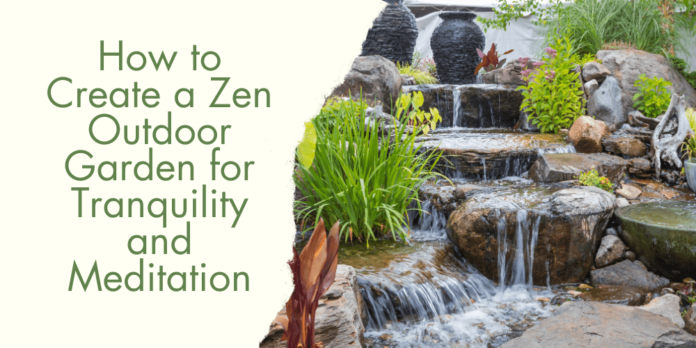In this fast-paced world, finding moments of peace and tranquility is essential for our mental well-being. One way to achieve this is by creating a Zen outdoor garden that can serve as a sanctuary for meditation and relaxation. Whether it’s a small balcony garden or an expansive backyard, we have you covered! In this guide, we’ll explore the steps on how you can create your own Zen garden for a tranquil oasis right in your own home. Let’s start!
Choosing the Right Plants
The first step to creating a Zen garden is selecting the right plants that promote a sense of calm and tranquility. Opt for low-maintenance plants such as bamboo, Japanese maple, and succulents that thrive in your climate. Consider incorporating water features like a small pond or a fountain to create a soothing atmosphere. You can also add fragrant plants like lavender and jasmine to further enhance the sensory experience.
Creating a Pathway
A key element of a Zen garden is the pathway that leads visitors through the space. Use a combination of gravel, stepping stones, or wooden planks to create a serene walkway that encourages mindfulness and contemplation. Add a bench or a hammock along the pathway to provide a space for relaxation and reflection. Make sure to keep the pathway free of clutter and well-maintained for a peaceful experience.
Setting Up a Meditation Area
Designate a quiet corner of your Zen garden as a meditation area where you can practice mindfulness and deep breathing exercises. Place a comfortable cushion or a meditation bench under a shaded area with a canopy or pergola roofing for added privacy. Surround the meditation area with fragrant plants like lavender or jasmine to enhance the sensory experience. You can also add natural elements like a small rock garden or a Buddha statue to further create a calming ambiance.
Incorporating Natural Elements
To create a harmonious balance in your Zen garden, incorporate natural elements such as rocks, sand, and wood. Use rocks of varying sizes to create a sense of tranquility and stability. Arrange them in a way that mimics natural landscapes like mountains or rivers. Add a sand garden or a rock garden to symbolize water or waves, promoting a sense of flow and movement. You can also use wood in the form of a bench, fence, or pergola to add warmth and natural texture to the space.
Maintaining Your Zen Garden
Once you have created your Zen outdoor garden, it is important to maintain it regularly to preserve its tranquility. Remove any weeds or debris, trim overgrown plants, and replenish the gravel or sand pathways as needed. Water your plants regularly and prune them to maintain their shape and health. Take time to sit in your garden, practice mindfulness, and appreciate the beauty of nature around you. This will help you recharge and find moments of peace amidst the chaos of daily life.
Personalizing Your Zen Garden
Adding personal touches to your Zen garden can make it more meaningful and reflective of your identity and interests. Consider adding pieces that speak to you, such as wind chimes for a hint of gentle melody, or unique sculptures that you connect with. Planting a favorite flower or incorporating a color theme throughout the garden can also add a personal layer to the overall serene atmosphere. In addition, the creative process of personalizing your garden also deepens your connection to this tranquil space, reflecting your inner peace and serenity.
Creating a Zen outdoor garden for tranquility and meditation is a rewarding and fulfilling project that can bring peace and serenity to your life. Whether you are a beginner gardener or a seasoned landscaper, implementing these tips will help you create a tranquil oasis in your backyard that promotes relaxation and mindfulness. So, start by gathering all the tools you need, curate the Zen garden project you’ve imagined, and experience the healing powers of nature in your own outdoor space!








![Avast Driver Updater Key 2022 | Activation Key V2.5.9 [Free]- Avast Driver Updater Key 2021](https://vintank.com/wp-content/uploads/2021/02/Avast-Driver-Updater-Key-2021-100x70.jpg)
![Avast Premier Activation Code and License Key [Working] Avast Premier Activation Code and License Key](https://vintank.com/wp-content/uploads/2021/09/Avast-Premier-Activation-Code-and-License-Key-100x70.jpg)
